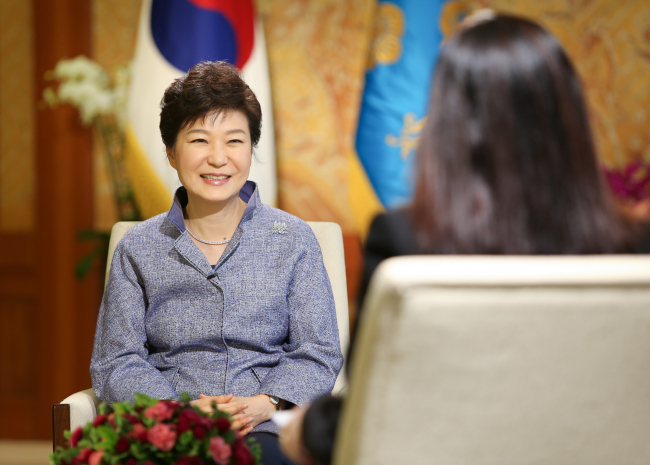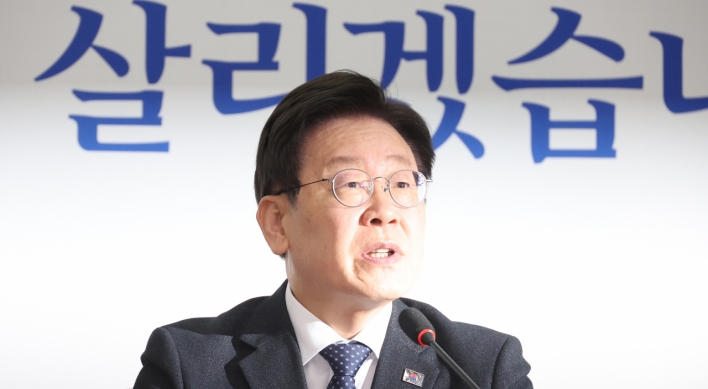
President Park Geun-hye urged Japanese leaders to make clear they honor the country’s past apologies for its colonial rule of Korea and not to engage in any acts that put their intentions into question.
Park made the remarks during an interview Monday with CNN, saying the past apologies, known as the “Kono statement” and the “Murayama statement” named after former Chief Cabinet Secretary Yohei Kono and former Prime Minister Tomiichi Murayama, have been the basis of relations between the two sides.
“We were able to move forward with Korea’s relationship with Japan over the years because Japanese political leaders have clearly stated through the Murayama as well as the Kono statement their correct understanding of history and this has allowed us to move our relationship forward,” Park said.
“I hope the current Japanese leaders will make sure they inherit the Murayama and the Kono statements and refrain from words and acts that put their sincerity into doubt,” she said.
Relations between Seoul and Tokyo have been frayed due mainly to Japan’s refusal to address long-running grievances over sexual slavery and other atrocities committed during its 1910-45 colonial rule of the Korean Peninsula and its repeated claims to South Korea’s easternmost islets of Dokdo.
The relations soured further recently after Japanese Prime Minister Shizo Abe paid his respects late last year at a war shrine that honors Japan’s war dead, including class A criminals. Abe was the first Japanese prime minister to visit the shrine in more than seven years.
South Korea and China, which suffered from Japan’s aggression in the early 20th century, have long resented visits to Tokyo’s Yasukuni Shrine by Japanese leaders, and the latest visit was considered a flagrant insult by Japan’s neighbors.
“I hope to move toward a future-oriented relationship with Japan based on correct understanding of history. In fact, it has been my desire to leave to my future generations a legacy of friendship and a legacy of being able to work together,” Park said in the interview.
Park said North Korea has been “very unpredictable but the level of unpredictability has in fact exacerbated” since last month’s execution of Jang Song-thaek, the once-powerful uncle of leader Kim Jong-un, on charges of attempting to seize power.
“The purging and execution of Jang Song-thaek has come as a huge shock to the Korean people as well as the world,” Park said.
“I am concerned about deepening volatility on the Korean peninsula and in the Northeast Asian region.”
Park said she is open to meeting with the young North Korean leader “when the need arises,” but growing uncertainty and unpredictability in Pyongyang makes it a top priority for the South to strengthen national security to safeguard the well-being of the Korean people.
Jang’s execution temporarily strengthened Kim’s power but it could also signal greater vulnerability in the regime, Park said, adding that what is important for the South is to “wait and see and make sure we have thorough preparations in place and to brace for every eventuality.”
Park said that a series of domestic and international assessments have suggested the possibility of North Korea attempting provocations, and those assessments “speak to the gravity of the situation.”
“One thing that is very clear is that any provocations will be met very firmly. I cannot be clearer about that,” she said. (Yonhap News)
Park made the remarks during an interview Monday with CNN, saying the past apologies, known as the “Kono statement” and the “Murayama statement” named after former Chief Cabinet Secretary Yohei Kono and former Prime Minister Tomiichi Murayama, have been the basis of relations between the two sides.
“We were able to move forward with Korea’s relationship with Japan over the years because Japanese political leaders have clearly stated through the Murayama as well as the Kono statement their correct understanding of history and this has allowed us to move our relationship forward,” Park said.
“I hope the current Japanese leaders will make sure they inherit the Murayama and the Kono statements and refrain from words and acts that put their sincerity into doubt,” she said.
Relations between Seoul and Tokyo have been frayed due mainly to Japan’s refusal to address long-running grievances over sexual slavery and other atrocities committed during its 1910-45 colonial rule of the Korean Peninsula and its repeated claims to South Korea’s easternmost islets of Dokdo.
The relations soured further recently after Japanese Prime Minister Shizo Abe paid his respects late last year at a war shrine that honors Japan’s war dead, including class A criminals. Abe was the first Japanese prime minister to visit the shrine in more than seven years.
South Korea and China, which suffered from Japan’s aggression in the early 20th century, have long resented visits to Tokyo’s Yasukuni Shrine by Japanese leaders, and the latest visit was considered a flagrant insult by Japan’s neighbors.
“I hope to move toward a future-oriented relationship with Japan based on correct understanding of history. In fact, it has been my desire to leave to my future generations a legacy of friendship and a legacy of being able to work together,” Park said in the interview.
Park said North Korea has been “very unpredictable but the level of unpredictability has in fact exacerbated” since last month’s execution of Jang Song-thaek, the once-powerful uncle of leader Kim Jong-un, on charges of attempting to seize power.
“The purging and execution of Jang Song-thaek has come as a huge shock to the Korean people as well as the world,” Park said.
“I am concerned about deepening volatility on the Korean peninsula and in the Northeast Asian region.”
Park said she is open to meeting with the young North Korean leader “when the need arises,” but growing uncertainty and unpredictability in Pyongyang makes it a top priority for the South to strengthen national security to safeguard the well-being of the Korean people.
Jang’s execution temporarily strengthened Kim’s power but it could also signal greater vulnerability in the regime, Park said, adding that what is important for the South is to “wait and see and make sure we have thorough preparations in place and to brace for every eventuality.”
Park said that a series of domestic and international assessments have suggested the possibility of North Korea attempting provocations, and those assessments “speak to the gravity of the situation.”
“One thing that is very clear is that any provocations will be met very firmly. I cannot be clearer about that,” she said. (Yonhap News)
-
Articles by Korea Herald



![[Herald Interview] 'Amid aging population, Korea to invite more young professionals from overseas'](http://res.heraldm.com/phpwas/restmb_idxmake.php?idx=644&simg=/content/image/2024/04/24/20240424050844_0.jpg&u=20240424200058)






![[Hello India] Hyundai Motor vows to boost 'clean mobility' in India](http://res.heraldm.com/phpwas/restmb_idxmake.php?idx=644&simg=/content/image/2024/04/25/20240425050672_0.jpg&u=)







